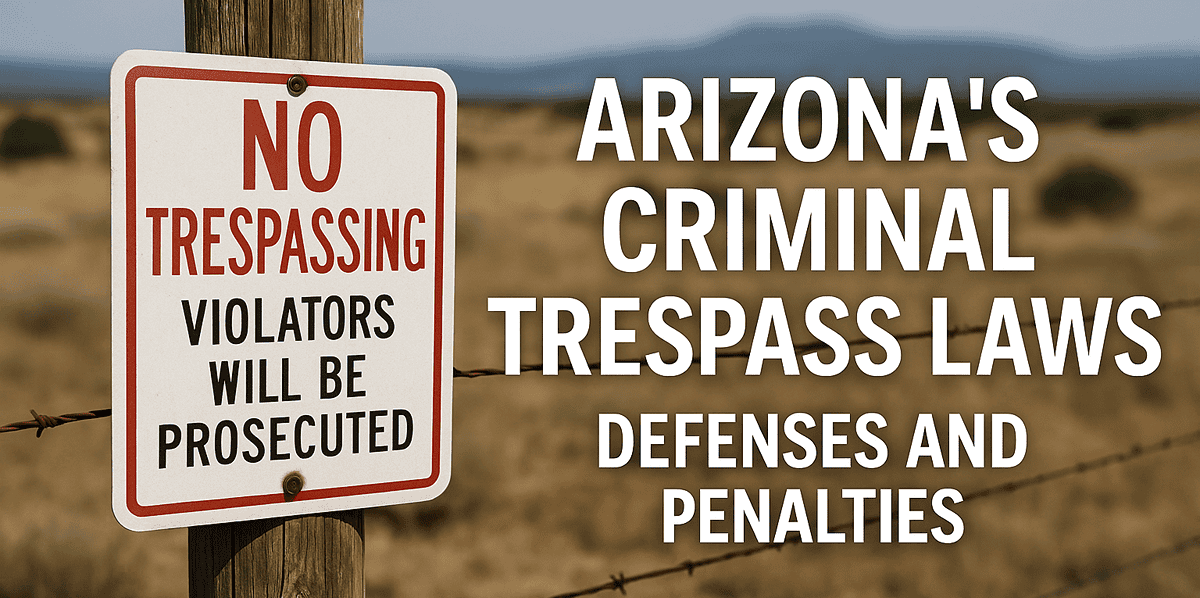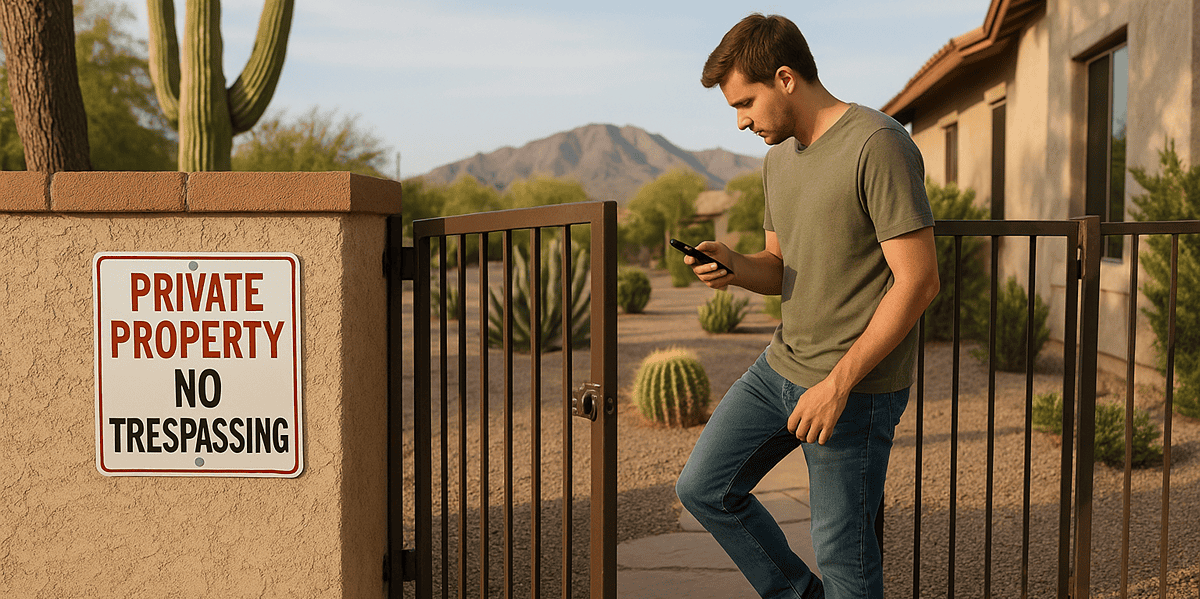Being cited or arrested for criminal trespass in Arizona can feel unfair, especially when the situation started as a misunderstanding, a property line mistake, or a request to leave that escalated quickly. Even so, a trespass conviction can affect employment, housing, and your record. Arizona treats property rights seriously, and the law divides trespass into three degrees, each with different elements and penalties.
This guide explains each degree of criminal trespass, penalties, real-world examples, and defense strategies that can protect you. You will also see how a defense lawyer like Arja Shah at Shah Law Firm approaches these cases across Phoenix, Scottsdale, Tempe, Mesa, Chandler, Glendale, and surrounding areas.
If you are already charged, do not panic. Many trespass cases can be reduced or dismissed when the facts and the law are presented, when the evidence is challenged, and when the prosecutor understands the context behind what happened.
- Understanding Arizona’s Trespass Framework
- Criminal Trespass in the Third Degree (ARS § 13-1502)
- Criminal Trespass in the Second Degree (ARS § 13-1503)
- Criminal Trespass in the First Degree (ARS § 13-1504)
- Penalties and Sentencing: What You Could Face
- Examples of Trespassing
- Defense Strategies That Work in Trespass Cases
- Important Things to Remember
- How Shah Law Firm Can Help
Understanding Arizona’s Trespass Framework
Arizona’s criminal trespass laws appear in a three-part structure, ARS §§ 13-1502, 13-1503, and 13-1504. Each degree focuses on the location of the entry and what made it unlawful.
- Third degree, usually land-based situations, like staying after a reasonable request to leave, or ignoring posted notices, or being on railroad property without authority.
- Second degree, entering or remaining in a nonresidential structure or a fenced commercial yard.
- First degree, the most serious form, covering residential structures and residential yards, peeping into a home, entering mining claim property to explore or take minerals, desecrating religious property on another’s land, and entering or remaining in or on a critical public service facility.
Statutory Langauge
Arizona law uses the phrase entering or remaining unlawfully, which means you did not have permission, or your permission was revoked, and you did not leave. The State must prove you knowingly entered or stayed without lawful authority. That knowledge element matters, and it is often a key focus in the defense.
Criminal Trespass in the Third Degree (ARS § 13-1502)
Third-degree trespass covers many everyday conflicts, such as when a store or property manager tells you to leave, a posted sign says no entry, or you cross onto railroad property without authorization. If you stay after a reasonable request to leave, or ignore posted notices, that can support a charge even if you did not damage anything.
A Class 3 misdemeanor may seem minor, but it is still a criminal offense. It can lead to jail exposure, fines, and a record. With the right approach, many third-degree cases can be resolved with diversion or dismissal, especially for people with no criminal history.
Common fact patterns
- Staying in a parking lot after a manager or officer says you must leave
- Crossing posted land for a shortcut
- Walking along railroad tracks or cutting through a rail yard
Criminal Trespass in the Second Degree (ARS § 13-1503)
Second-degree trespass focuses on business property and nonresidential buildings or structures, for example, offices, warehouses, storage units, closed shops after hours, or fenced commercial lots that protect inventory or equipment.
You do not need to intend theft or damage for this charge to apply; the State must prove only that the entry or remaining was unlawful and that you knew it.
Common fact patterns
- Entering a closed office building lobby at night through an unlocked door,
- Wandering around a fenced car lot after hours,
- Stepping into a business storage area marked employees only, then refusing to leave,
Key Defense Themes in Second-Degree Trespass Cases
When defending against second-degree trespass charges, several important questions often come into play:
- Was the yard truly fenced? Sometimes fences are broken, incomplete, or do not clearly enclose the area. If the yard was not fully secured, the charge may not apply.
- Did the structure qualify as nonresidential? Arizona law treats homes differently from businesses. A defense may argue that the building does not meet the definition of a “nonresidential structure.”
- Were the signs or boundaries clear? If there were no visible “No Trespassing” signs or the property lines were confusing, it may be unfair to claim you knowingly trespassed.
- Was consent given? If an employee, manager, or security guard gave you permission to be on the property, that can serve as a defense.
- Did you knowingly remain unlawfully? Prosecutors must prove you stayed without permission on purpose. If you thought you had a right to be there, or you left when asked, that weakens the case.
These factors can make the difference between a conviction and a dismissal or reduction of charges.
Criminal Trespass in the First Degree (ARS § 13-1504)
First-degree trespass captures the most sensitive locations and conduct.
- Residential structures mean homes and apartments.
- Fenced residential yards are protected spaces around a house.
- Peeping, which involves looking into a house from a yard, is a criminal act when done without lawful authority and with reckless disregard for privacy.
- Mining claim property has special protection when someone enters unlawfully to explore or take minerals.
- Desecrating religious property while trespassing raises the level to a felony
- Critical public service facilities include places like water treatment plants and power facilities.
Key Details That Drive Charging Decisions in First-Degree Trespass
Prosecutors look at specific details when deciding how serious a first-degree trespass charge will be. Some of the most important factors include:
- Was the structure residential or nonresidential? Entering a home or apartment is treated far more seriously than entering a business or storage building.
- Was the yard fenced, and was the fence obvious? The law requires a fenced residential yard for specific charges. If the fence was broken or unclear, that may impact the case.
- Was there looking into the residence with disregard for privacy? Accusations of peeping or invading someone’s privacy can elevate the seriousness of the charge.
- Did the State allege a critical public service facility? Entering places like water plants or power facilities can result in a felony charge.
- Did the conduct involve desecration of religious property? Damaging or defacing religious property while trespassing is treated as a felony under Arizona law.
Each of these details affects whether the charge is a misdemeanor or a felony and what penalties you might face.
Penalties and Sentencing: What You Could Face
Arizona sets penalties based on the degree and the classification. Note that sentences can vary with criminal history, whether the offense is designated as dangerous, and other factors. Judges may order probation in many misdemeanor cases and some felony cases for first-time, non-dangerous crimes.
Third-Degree Criminal Trespass:
- Class 3 misdemeanor
- Up to 30 days in jail
- Fines that can reach 500 dollars, plus surcharges
- Probation may be available, often with classes or community service
Second-Degree Criminal Trespass:
- Class 2 misdemeanor
- Up to 4 months in jail
- Fines up to 750 dollars, plus surcharges
- Probation or diversion may be possible for first-time cases
First-Degree Criminal Trespass:
- Class 1 misdemeanor
- Subsections (A)(2), (A)(3), (A)(4)
- Up to 6 months in jail
- Fines up to 2,500 dollars
- Probation commonly considered
- Class 6 felony
-
- Subsection (A)(1) and (A)(5 )
- Potential prison under Arizona felony sentencing laws (often up to 2 years for non-dangerous first offenses)
- Probation may be possible
- Class 5 felony
- Subsection (A)(6)
- Potential prison under Arizona felony sentencing laws (often up to 2.5 years for non-dangerous first offenses)
- Probation may be possible
Other possible consequences
- Criminal record visible to employers and landlords
- Court-ordered classes, counseling, and restitution if property damage is alleged
- Immigration and professional licensing are impacted in some cases
- Civil no trespass notices or injunctions
Attorney Arja Shah regularly pushes for diversion, deferred judgment, or reduction to a lower degree when the facts support it. In more serious first-degree cases, she works to remove felony designations when appropriate or secure probation instead of prison by highlighting the lack of criminal history, cooperation, and restitution where applicable.
Examples of Trespassing
Example 1, Posted lot shortcut in Chandler
A student cuts across posted private property to save time walking home. A supervisor asks the student to leave, the student hesitates, an officer repeats the request, and a citation is issued. This likely fits third-degree trespass. With a clean record and a respectful approach to the court process, this type of matter can often end in diversion or dismissal after a short class.
Example 2, Fenced car lot after hours in Mesa
Two friends squeeze through a gap in a fence to walk around a dealership after closing time. Security calls the police. There is no theft or damage. This likely fits second-degree trespass, a Class 2 misdemeanor. Outcome often turns on proof of the fence, any signage, and whether the State can show a knowing, unlawful entry. Many times, a plea to a lower offense or a deferred judgment is possible.
Example 3, Wrong backyard in Scottsdale
During a neighborhood gathering, a guest wanders into the wrong fenced residential yard while making a phone call. The homeowner calls the police. This likely fits first-degree trespass as a Class 1 misdemeanor. If the guest cooperates and there is no prior record, a defense lawyer can often resolve the matter with a dismissal after conditions or a plea to a lesser offense.
Example 4, Looking into a home in Tempe
Someone enters a residential yard and looks into the residence in a way that disregards privacy. This likely would be classified as a Class 1 misdemeanor. The defense will focus on whether the person actually entered the yard, whether the conduct was truly a privacy invasion, and whether there is reliable evidence, such as video.
Example 5, Water facility at night in Phoenix
A person climbs a fence and enters a critical public service facility, even with no damage, which is classified as a class 5 felony. These cases are severe because of infrastructure risks. A successful defense may involve challenging identification, intent, and the designation of the site, or negotiating for a reduced charge when facts allow.
Defense Strategies That Work in Trespass Cases
Every case is different, but strong defenses often fall into several themes. Attorney Arja Shah reviews the who, where, what, and why of the entry, then tests every element the State must prove.
Consent or apparent authority
- If an owner, tenant, employee, or security guard with authority granted permission, even informally, that can defeat the claim that the entry or remaining was unlawful.
- Texts, messages, or prior practice can show consent
No knowing mental state
- Trespass requires knowingly entering or remaining unlawfully
- If you believed you had permission, or did not realize you were on private property, or you left once asked, that can undercut the State’s proof
Unclear boundaries or signage
- For yard or property cases, the State leans on fences and signs
- Photos, maps, and witness testimony can show that lines were unclear or that signage was missing or not visible
Officer or owner requests issues
- A request to leave must be reasonable
- If the person left promptly once an explicit request was made, a defense may argue that the statute was not violated.
- Subsection B treats a police request as an owner request only when the officer is acting at the owner’s request, which can be a factual issue.
Identity and proof problems
- Many trespass cases rely on low-quality video or brief eyewitness accounts
- If identification is weak or the timeline does not fit, the State’s case may not meet the burden of proof
Privacy and peeping claims
- The statute requires entering the yard and looking into the residence without lawful authority and with reckless disregard for privacy
- The defense can dispute whether the person actually entered the yard, whether there was a legitimate reason to be there, and whether the alleged looking happened at all.
Necessity or emergency context
- Entering the property to avoid immediate harm or to seek help can create a necessity argument.
- Courts view these fact patterns case by case
Constitutional issues
- If the stop, detention, or arrest lacked reasonable suspicion or probable cause, or if statements were taken without Miranda where required, the defense can seek to exclude evidence.
- Any search of a phone or backpack raises additional Fourth Amendment questions.
Important Things to Remember
- Trespass in Arizona is divided into three degrees
- The State must prove you knowingly entered or remained unlawfully
- Defenses often center on consent, knowledge, unclear boundaries, identity, and constitutional issues
- Attorney Arja Shah often negotiates reductions, diversion, or probation, especially for first-time clients
How Arja Shah Can Help You Fight False Allegations
When you call Shah Law Firm, you speak with a lawyer who understands that a trespass case is not just a file number; it is your job, your housing, and your future. Arja Shah brings nearly two decades of criminal defense experience and has helped clients in more than 3,000 cases across Metro Phoenix and beyond.
Call Shah Law Firm today at (602) 560-7408 or visit arjashahlaw.com to schedule your free one-on-one consultation with Arja Shah. Let an experienced Phoenix criminal defense lawyer fight to protect your future.








